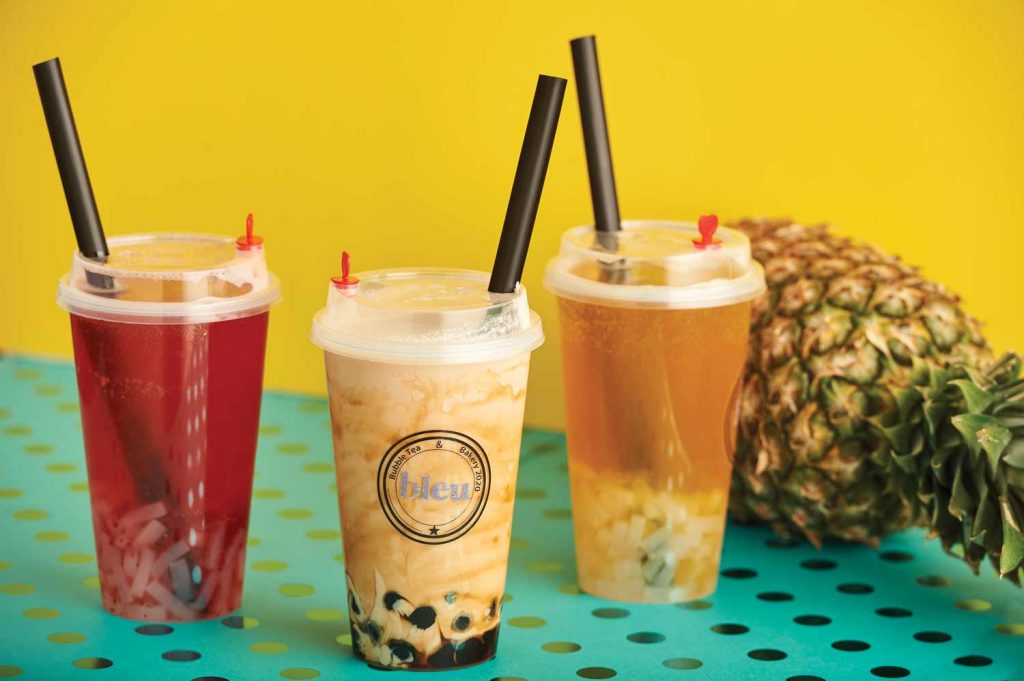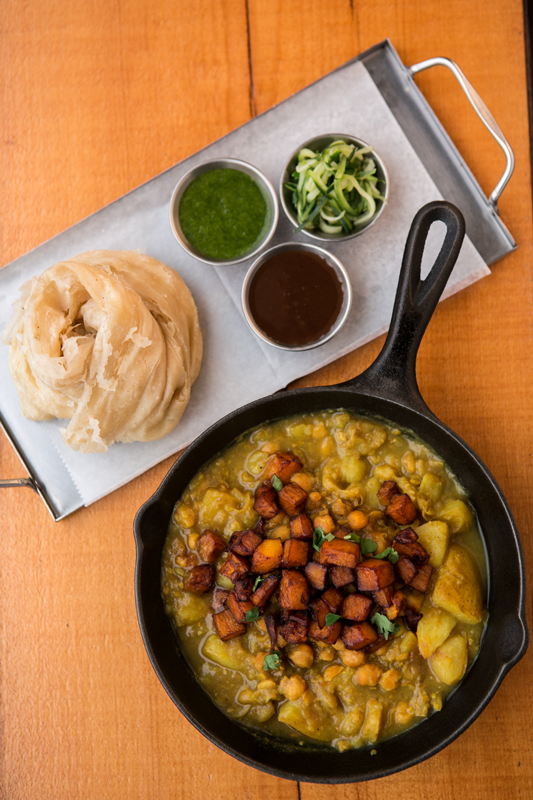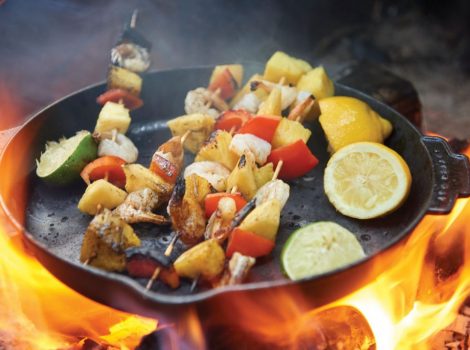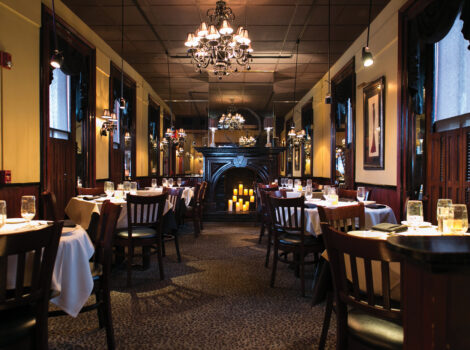Bubble Tea: Full Circle
Originally published in the April 2021 issue of LCM
Get ready to celebrate! National Bubble Tea Day is April 30! You say you’ve been in a Covid bubble for the last 12 months and have lost track of the latest trends, including bubble tea? As the uninitiated will discover, bubble tea is easy to love – the milky-sweet and colorful tea is similar to a latte.
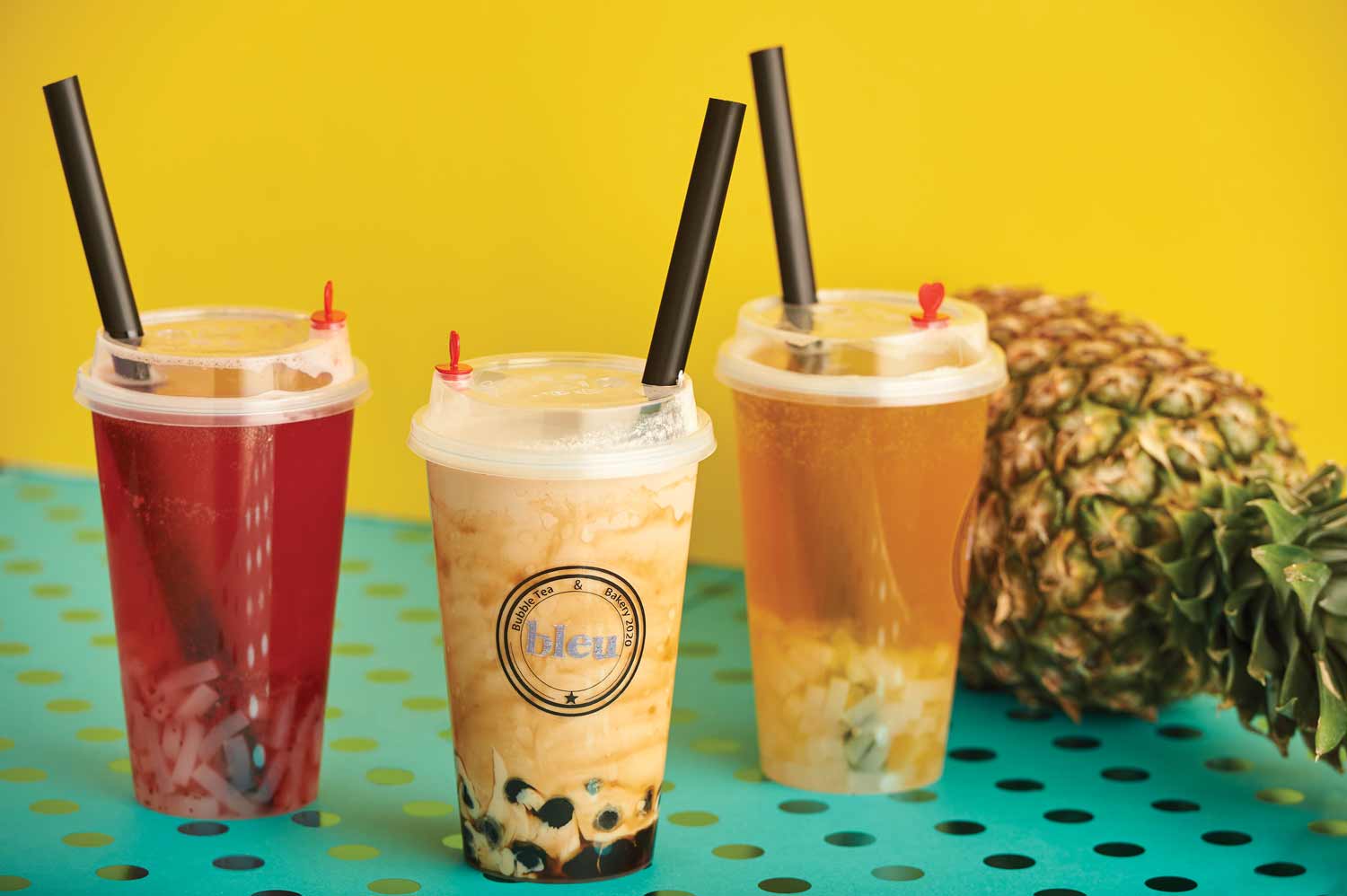
How huge is bubble tea? According to CNN Travel, three years ago sales increased by 3,000% in Southeast Asia. Worldwide they are expected to increase by $2 billion over the next five years (sales estimates now stand at $4.3 billion). McDonald’s German restaurants have added bubble tea to their menus. In 2020, bubble tea became an official emoji. Bubble tea pizza is now a thing. In Singapore, fans of bubble tea swarmed shops ahead of their Covid-related shutdowns last spring.
The roots of bubble tea can be traced to the late ‘40s, when a mixologist named Chang Fan Shu opened a shop in Taiwan, where he used cocktail shakers to create a rich and silky tea topped by fine air bubbles. The drink was remarkable – even revolutionary – for two reasons: served cold, it was intended to be enjoyed at one’s leisure.
Fast forward 40 years to 1986, when a struggling artist/entrepreneur named Tu Tsong-He jumped on the cold-beverage trend and added tapioca balls (fenyuan) to tea. (The tapioca balls had been a favorite childhood treat.) The resulting visual made him think of his mother’s pearl necklace, hence he called his drink “zhen zhu lu cha” (pearl green tea). Further experimentation with black tapioca balls produced a tea with an even richer taste and chewier texture. He worked with a manufacturer to produce straws large enough to imbibe the tapioca balls. His Hanlin teahouses and tea rooms can now be found across the globe.
Yet another person was claiming credit for the development of what became known as bubble tea. Lin Hsiu Hui, the product manager for Chun Shui Tang (now an international chain of teahouses), proclaimed that she developed bubble tea in 1988 during a staff meeting when, out of boredom, she mixed some tapioca balls into her tea. Meeting attendees who sampled the concoction loved it and further experimentation led to the development of a bubble tea that quickly outsold the company’s lineup of ice teas.
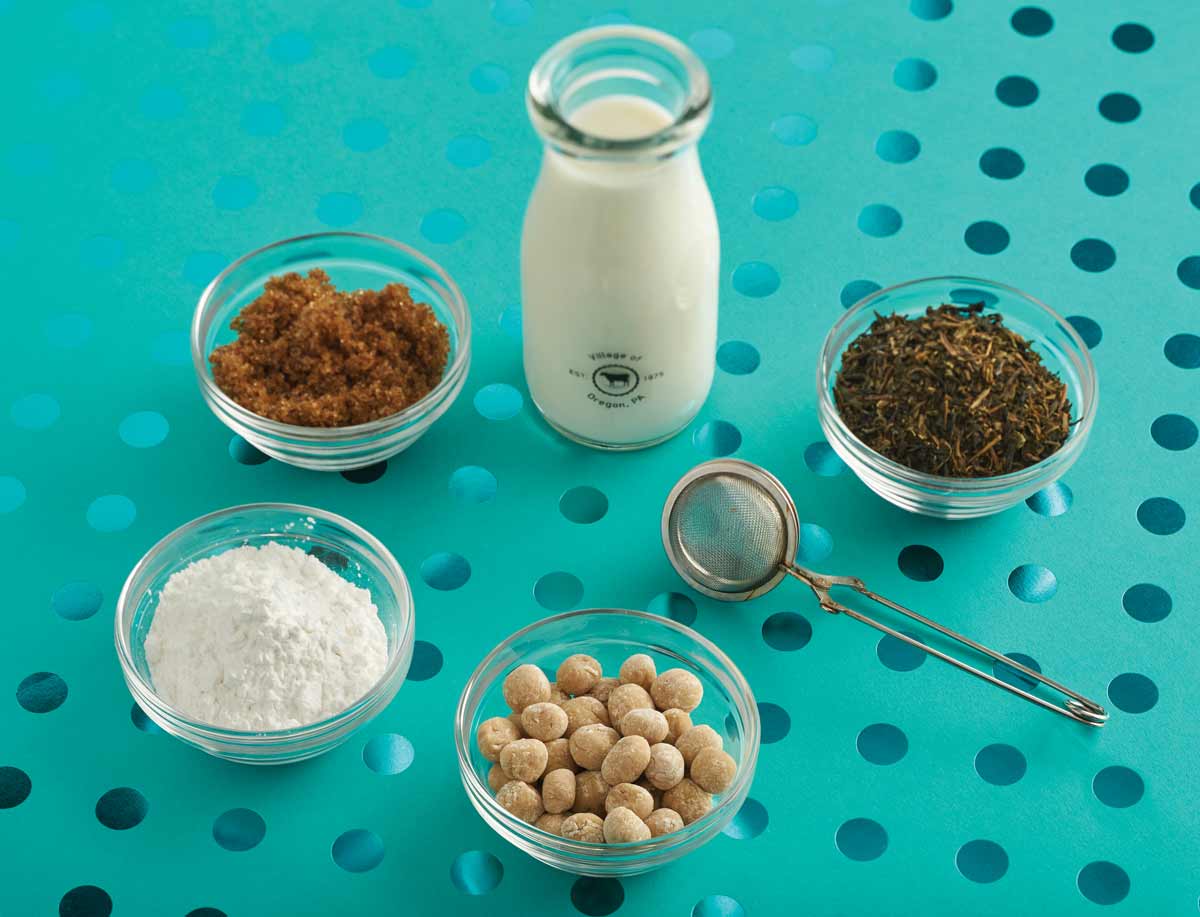
The competition over the bubble tea market grew fierce and by 2009 the two factions were in court in an effort to determine who could rightfully be declared the inventor of bubble tea. Ten years later, a verdict was issued. The Taiwanese court determined that since the tea industry is one of friendship, the matter of who “invented” bubble tea is a moot point.
According to scholars and food historians (again via CNN Travel), bubble tea gained international attention in 2004, when the Taiwanese government was negotiating an arms deal. Citizens balked at its cost and the government proposed that if every citizen would skip one serving of bubble tea per week for the following 15 years, the arms deal could easily be afforded. The Taiwanese people were so “up in arms” over the proposal that it became international news.
Meanwhile, the bubble tea phenomenon caught the attention of former investment banker, Assad Khan, who tasted the drink in New York and set his sights on launching his own venture. Bubbleology became the toast of London and Khan is now researching the premise of developing a line of “skinny teas” that will appeal to health and weight-conscious bubble tea fans.
The first time I sampled bubble tea was during Apple training in California, and I was instantly hooked. Compared to a latte, the intense shades of red, orange, yellow and even green stand out. Bubble tea requires an oversized straw so large in diameter it could be described as a tube. At the bottom of the drink, and necessitating such a straw, are circular bubbles, or tapioca pearls known as boba. Think of it like finding the cherry at the bottom of an ice cream sundae. The discovery is just as delightful.
What follows are some tips and tidbits to get you started on the path to becoming a fan of bubble tea.
Boba
Boba, or tapioca pearls, add a subtle sweetness to bubble tea. They are all about texture, too. Boba should be soft and chewy and not hard or sticky. Ready-to-cook boba, which is made using tapioca starch (or tapioca flour), brown sugar and water, is quickly boiled and chilled. The texture and sweetness of well-made boba should be reminiscent of gummy bears.
When people hear the word “tapioca,” they think of the pudding their grandmothers made. Actually, the powder found in the baking aisle comes from cassava root that is native to Vietnam and gets the flavor and texture wrong. However, bubble tea and the tapioca pudding of your childhood do share tapioca starch as a common ingredient.
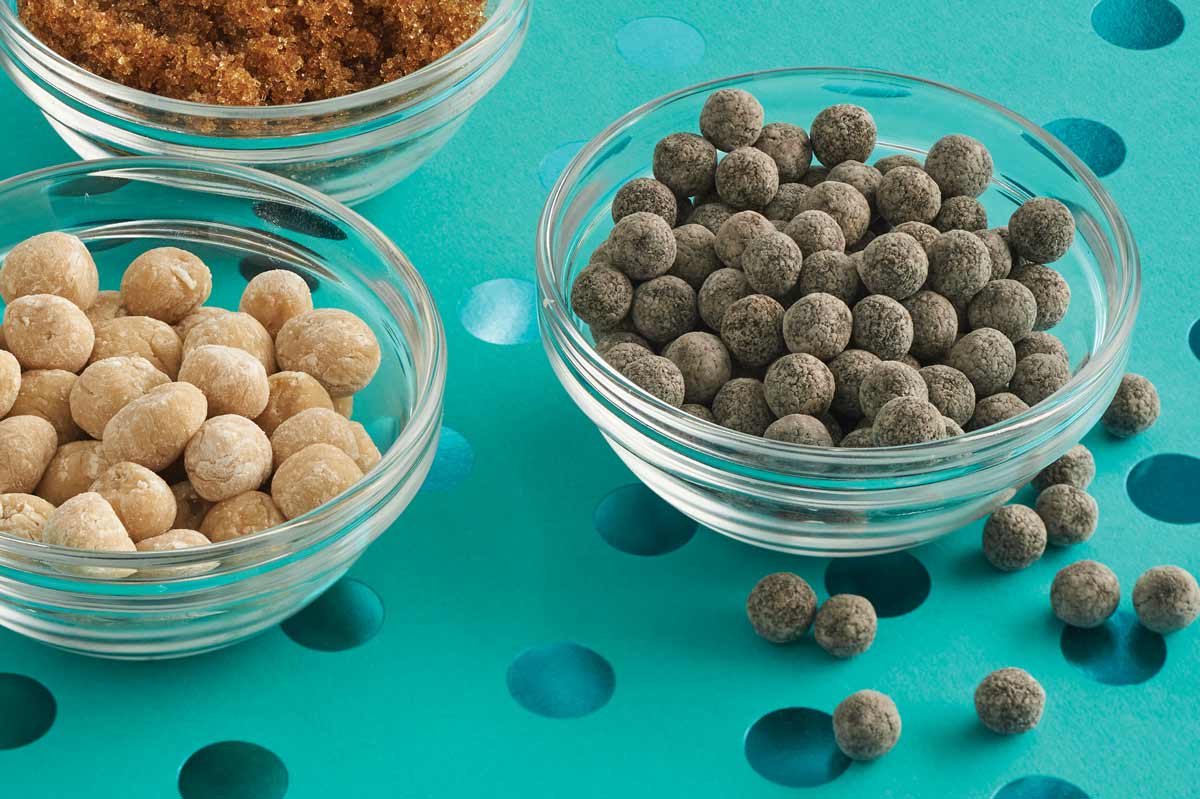
Types of Bubble Tea
Replace the milk with puréed fruit and you end up with a refreshing fruit tea. Both milk- and fruit-based bubble teas can be made with green or black tea, and all else equal, the flavor change is astounding. I thought I preferred bubble tea made with black tea until discovering a new favorite: honeydew milk green tea with boba. While boba is the best-known “topping” for bubble tea, lychee is a delicious, tropical fruit native to China with a firm, gumdrop-like texture.
Placing Your Order
When ordering bubble tea, specify if you want it to be made with milk or fruit. Milk-powder is chosen for the texture and for the benefit of those who are lactose intolerant. Next, choose black or green tea, followed by your preferred level of sweetness. The default sweetness for a recipe is 100% and it can be adjusted to taste at levels of 30%, 50% or 70%. Toppings are the paramount choice: boba pearls pair better with milk tea, while lychee complements fruit teas. The amount of ice you want, if any, as well as drink size, are specified.
Bleu Bubble Tea & Bakery
When Bleu Bubble Tea & Bakery opened inside the Asian Center Supermarket (located off the Rohrerstown Road in Lancaster), it grabbed my attention. I had to check it out. The bubble tea is outstanding and begged the question: what would prompt someone to open a food-service business in the winter during a pandemic? Who would risk starting a new business now? It was there I met Cherie (Yi) Que and her husband, John (Jiang) Lu, part-owners of Bleu.
Like many others, John was laid off from his job last year due to the pandemic. “A lot of people lost their jobs,” says Cherie. “We don’t want to depend or count on the government for something. We want to bring happiness to ourselves,” she explains. “We believe in our own hands.” So, John decided he would start a business and drew inspiration from Cherie’s love of bubble tea.
In September 2020, when Cherie and John learned from the owner of the Asian Center Supermarket that a spot was available for a small business, she immediately called her best friend, Erin (Yulan) Cui, whose significant other, West (Xi) Chen, was the general manager of a Korean bakery and bubble tea shop. It was there that Erin and West first met. Every morning on her way to work, Erin would stop at the bakery for fresh bread and a lactose-free coffee, specially made by West.
The pending partnership would combine their talents. West had experience operating such a business and because Erin’s parents own a nail salon, she was familiar with the process of maintaining a business. John would bring a strong background in software, while Cherie would contribute her knowledge of marketing. Together the two couples built Bleu; the heart that caps each container of bubble tea is a nod to the love they hold for each other.
By October, John and West committed to the idea and took two weeks to menu plan for their bubble tea shop. They prepared “three or four varieties of each recipe,” says John, who labored over quality ingredients to find the right textures, consistency and combinations of flavors. “If I don’t like it, we won’t sell it to customers,” says John. “We are proud of our boba.” West, meanwhile, kept Erin in mind while creating lactose-free recipes, knowing she could enjoy them. As for the bakery component, equipment remained from a previous business and they wanted to make use of it. To avoid any leftovers, one batch of steamed buns is made each morning around 10:30 a.m., including a personal favorite, taro buns.
Choosing the French spelling of blue – symbolizing calmness and tranquility – Bleu Bubble Tea & Bakery opened on December 11, 2020.
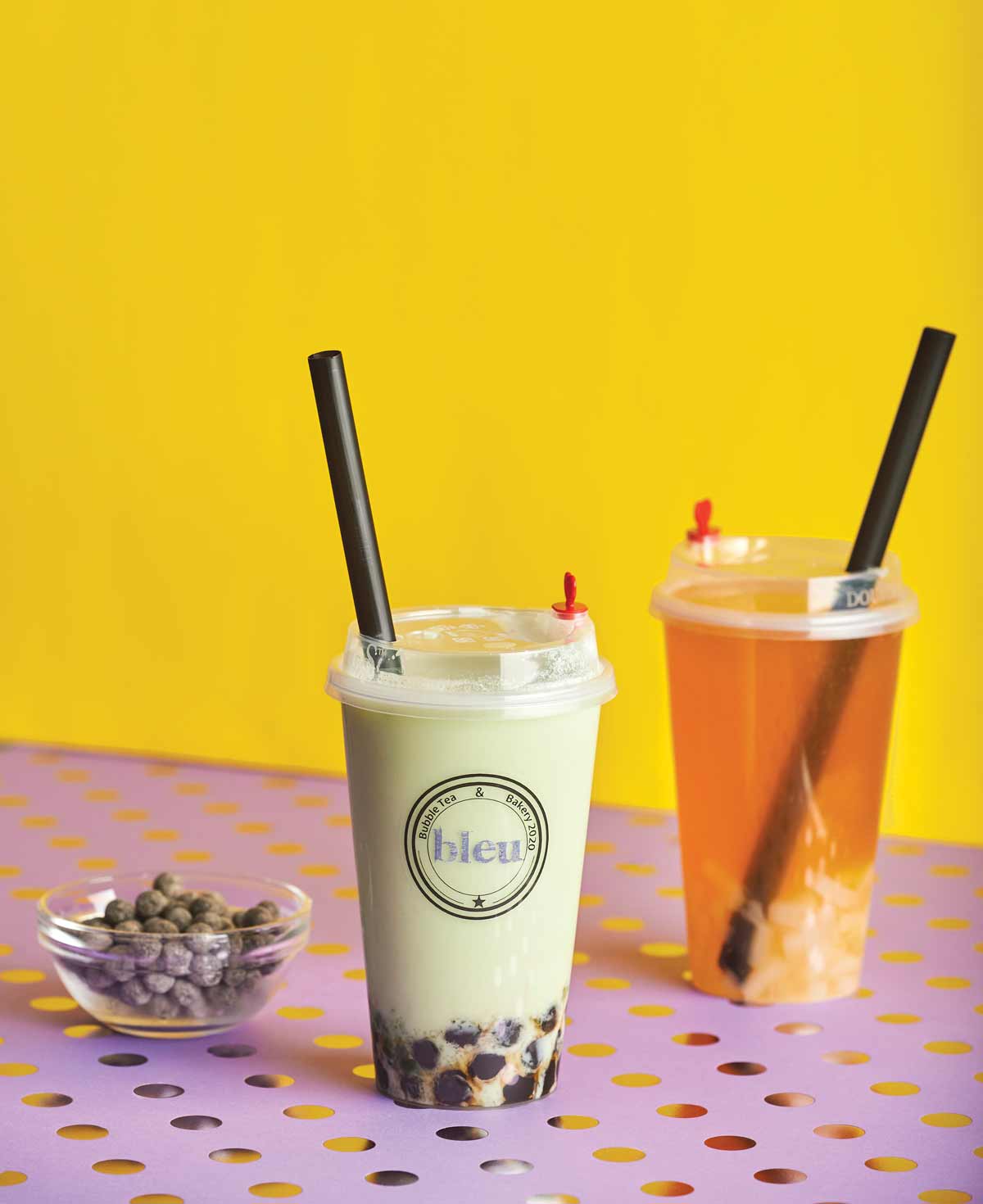
A Bigger Leap
It turns out that starting a new business wasn’t the first time John took a big leap. He and Cherie met in 2006, growing up together in Guangxi Province in China, where the two were high school sweethearts. While still in school, John’s family moved to the United States. Being separated by such a great distance prompted John and Cherie to end their relationship. “We never forgot each other,” Cherie says. “John called me every single year on my birthday.”
On Cherie’s birthday in 2012, her then-boyfriend missed the event, causing their relationship to end. However, the ever-faithful John called Cherie from the U.S. to wish her a happy birthday only to discover it was not a joyful day. “He could tell I was a little bit down,” Cherie says. After Cherie explained what had happened, John asked, “If I could go back to China, would you give me another chance?”
Two days later, John was on a 17-hour flight to visit Cherie in China. “My boyfriend in another city in China can’t make it, but John lives in America and flew across the entire Pacific Ocean. He made it. He made it,” says Cherie. “He brought me a special gift: a wedding band,” she says. Cherie recalls asking, “John, after so many years, why are you so sure it’s me? What if I had become a really ugly monster?” Nonetheless, her answer was, “Of course, yes!” She adds, “That’s the reason why we’re here!”
The pair married a year later and planned a new future together. Because Cherie had a government position working at a police department handling security data, John offered to move back to China; however, they decided she would join him in the United States.
Full Circle
Cherie points out that the shape of boba in tea and the circle in Bleu’s logo, which she designed, have a deeper cultural meaning. The shape of a circle has a timeless significance in Chinese culture, and it holds a relatability in much of Asian culture. “The circle is one, no beginning and no end, no source and no end,” Cherie explains, paraphrasing from Chinese Zen. “One is all.”
Elaborating further, Cherie explains that Asian cultures teach people to be self-contained, humble in keeping to themselves while avoiding friction. A person exists within his or her circle, having no sharp edges to cause friction or abrasions to others. As a smooth sphere rolls forward through challenges and adversity, it slows down for nothing that could cause harm. So, too, should a person strive to be.
These values can present themselves as naivety or passivity, but Cherie’s words are powerful amid a global pandemic. Over the last year, the Asian-American community has faced a dramatic increase of threats and hate crimes across the United States, brought about by COVID-19. Driven by unfounded fear, it’s hard to see a young couple with big dreams intensely and wrongfully targeted for starting the pandemic itself. It’s an immense burden the Asian community faces daily while enduring the frustrations and challenges we all face.
“It’s really scary,” says Cherie. “No matter what tone of skin you are, we’re all human beings. There is no difference between you and me. The Asian community is also suffering from Covid. No virus has any nationality. It’s global,” she observes. “Before the pandemic came, we started wearing masks. We want to protect ourselves and other people. It’s respectful for everybody. We do our best to protect everyone.”
In Asian cultures, when someone has a cold, they’ll wear a mask out of basic respect and common courtesy to others. Not only is it kind, but the alternative – getting others sick – also seems irrational. “We should work together, holding one another’s hands, like a circle,” she theorizes.
Earth, our blue marble hanging in space, contains the only-known life in the universe. All life, especially human life, is an exceptional rarity. How can we not treat others with recognition, worthy of our respect and equality? A cultural symbol as simple as a circle puts stewardship and kindness into greater perspective.
Looking forward, Cherie says she would love to see Bleu “grow stronger and for it to be a voice.” Their new business is building their track and creating jobs, while supporting other local businesses and bringing in tax dollars. “Money is not the most important thing,” says Cherie. “My biggest dream is for everything to be peaceful. We don’t want to see any hatred on the streets. We all live together on this planet. We are all the same.”
Where to Find It
Bleu Bubble Tea & Bakery
2060 Bennett Ave., Lancaster (Inside the Asian Center Supermarket)
Hippo Bubble Tea
Hawthorne Center, 2050 Fruitville Pike, Lancaster
Buboo Smoothie and Tea House
Park City Center, Lancaster

